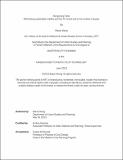| dc.contributor.advisor | Sevtsuk, Andres | |
| dc.contributor.author | Wang, Elaine | |
| dc.date.accessioned | 2023-10-18T17:09:38Z | |
| dc.date.available | 2023-10-18T17:09:38Z | |
| dc.date.issued | 2023-06 | |
| dc.date.submitted | 2023-09-18T20:06:48.087Z | |
| dc.identifier.uri | https://hdl.handle.net/1721.1/152483 | |
| dc.description.abstract | Cities around the world are going car-free. With concepts like the 15-minute city, planners and policymakers are investing in more sustainable transit modes: walking, biking, and public transit. Though this shift is critical to reducing emissions, it raises important equity issues that need to be explored. How does the move toward sustainable mobility impact equity? How might it address existing inequality or create new sources of inequality? And how can we ensure an equitable shift to sustainable mobility? This thesis explores these questions, using Hong Kong as a case study. By using spatial analysis, it introduces a Sustainable Mobility Score that quantifies access to urban amenities via sustainable transport modes, like walking and public transit. It then analyzes the relationship between this scoring system and neighborhood income levels. The results show that walkability is linked to spatial segregation, but public transit serves as an equalizer across different neighborhoods. Finally, this thesis discusses the implications of these findings to inform an equitable shift to sustainable mobility. | |
| dc.publisher | Massachusetts Institute of Technology | |
| dc.rights | In Copyright - Educational Use Permitted | |
| dc.rights | Copyright retained by author(s) | |
| dc.rights.uri | https://rightsstatements.org/page/InC-EDU/1.0/ | |
| dc.title | Hong Kong Time: Rethinking sustainable mobility and the 15-minute city in the context of equity | |
| dc.type | Thesis | |
| dc.description.degree | M.C.P. | |
| dc.contributor.department | Massachusetts Institute of Technology. Department of Urban Studies and Planning | |
| mit.thesis.degree | Master | |
| thesis.degree.name | Master in City Planning | |
